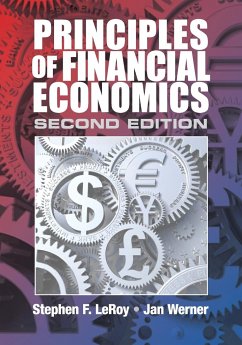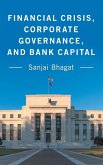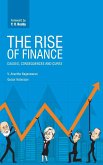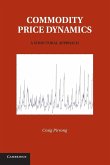- Broschiertes Buch
- Merkliste
- Auf die Merkliste
- Bewerten Bewerten
- Teilen
- Produkt teilen
- Produkterinnerung
- Produkterinnerung
This second edition includes new chapters on infinite-time security markets and more focus on portfolio choice and risk allocations.
Andere Kunden interessierten sich auch für
![Financial Crisis, Corporate Governance, and Bank Capital Financial Crisis, Corporate Governance, and Bank Capital]() Sanjai BhagatFinancial Crisis, Corporate Governance, and Bank Capital41,99 €
Sanjai BhagatFinancial Crisis, Corporate Governance, and Bank Capital41,99 €![Handbook of Research on Climate Change and the Sustainable Financial Sector Handbook of Research on Climate Change and the Sustainable Financial Sector]() Handbook of Research on Climate Change and the Sustainable Financial Sector339,99 €
Handbook of Research on Climate Change and the Sustainable Financial Sector339,99 €![Connectedness and Contagion Connectedness and Contagion]() Hal S. ScottConnectedness and Contagion37,99 €
Hal S. ScottConnectedness and Contagion37,99 €![An Introduction to Econophysics An Introduction to Econophysics]() Rosario N. MantegnaAn Introduction to Econophysics58,99 €
Rosario N. MantegnaAn Introduction to Econophysics58,99 €![The Rise of Finance The Rise of Finance]() V. Anantha NageswaranThe Rise of Finance106,99 €
V. Anantha NageswaranThe Rise of Finance106,99 €![Deflation Deflation]() Richard C. K. Burdekin / Pierre L. Siklos (eds.)Deflation67,99 €
Richard C. K. Burdekin / Pierre L. Siklos (eds.)Deflation67,99 €![Commodity Price Dynamics Commodity Price Dynamics]() Craig PirrongCommodity Price Dynamics35,99 €
Craig PirrongCommodity Price Dynamics35,99 €-
-
-
This second edition includes new chapters on infinite-time security markets and more focus on portfolio choice and risk allocations.
Hinweis: Dieser Artikel kann nur an eine deutsche Lieferadresse ausgeliefert werden.
Hinweis: Dieser Artikel kann nur an eine deutsche Lieferadresse ausgeliefert werden.
Produktdetails
- Produktdetails
- Verlag: Cambridge University Press
- Seitenzahl: 370
- Erscheinungstermin: 26. Februar 2016
- Englisch
- Abmessung: 254mm x 178mm x 21mm
- Gewicht: 695g
- ISBN-13: 9781107673021
- ISBN-10: 110767302X
- Artikelnr.: 41150783
- Herstellerkennzeichnung
- Libri GmbH
- Europaallee 1
- 36244 Bad Hersfeld
- gpsr@libri.de
- Verlag: Cambridge University Press
- Seitenzahl: 370
- Erscheinungstermin: 26. Februar 2016
- Englisch
- Abmessung: 254mm x 178mm x 21mm
- Gewicht: 695g
- ISBN-13: 9781107673021
- ISBN-10: 110767302X
- Artikelnr.: 41150783
- Herstellerkennzeichnung
- Libri GmbH
- Europaallee 1
- 36244 Bad Hersfeld
- gpsr@libri.de
Stephen F. LeRoy is Professor of Economics Emeritus at the University of California, Santa Barbara. Early in his career, he was an economist in the research departments of the Federal Reserve Bank of Kansas City and the Board of Governors of the Federal Reserve System. He then moved to the economics department at the University of California, Santa Barbara. He also served as Carlson Professor of Finance in the Carlson School of Management, University of Minnesota. He has had visiting appointments at the University of California, Berkeley, the University of California, Davis, the California Institute of Technology, and the University of Chicago. He earned his PhD in economics from the University of Pennsylvania.
Preface
Part I. Equilibrium and Arbitrage: 1. Equilibrium in security markets
2. Linear pricing
3. Arbitrage and positive pricing
Part II. Valuation: 4. Valuation
5. State prices and risk-neutral probabilities
Part III. Portfolio Restrictions: 6. Portfolio restrictions
7. Valuation under portfolio restrictions
Part IV. Risk: 8. Expected utility
9. Risk aversion
10. Risk
Part V. Optimal Portfolios: 11. Optimal portfolios with one risky security
12. Comparative statics of optimal portfolios
13. Optimal portfolios with several risky securities
Part VI. Equilibrium Prices and Allocations: 14. Consumption-based security pricing
15. Complete markets and Pareto-optimal allocations of risk
16. Optimality in incomplete markets
Part VII. Mean-Variance Analysis: 17. The expectations and pricing kernels
18. The mean-variance frontier payoffs
19. Capital asset pricing model
20. Factor pricing
Part VIII. Multidate Security Markets: 21. Equilibrium in multidate security markets
22. Multidate arbitrage and positivity
23. Dynamically complete markets
24. Valuation
Part IX. Martingale Property of Security Prices: 25. Event prices, risk-neutral probabilities, and the pricing kernel
26. Martingale property of gains
27. Conditional consumption-based security pricing
28. Conditional beta pricing and the CAPM
Part X. Infinite-Time Security Markets: 29. Equilibrium in infinite-time security markets
30. Arbitrage, valuation, and price bubbles
31. Arrow-Debreu equilibrium in infinite time.
Part I. Equilibrium and Arbitrage: 1. Equilibrium in security markets
2. Linear pricing
3. Arbitrage and positive pricing
Part II. Valuation: 4. Valuation
5. State prices and risk-neutral probabilities
Part III. Portfolio Restrictions: 6. Portfolio restrictions
7. Valuation under portfolio restrictions
Part IV. Risk: 8. Expected utility
9. Risk aversion
10. Risk
Part V. Optimal Portfolios: 11. Optimal portfolios with one risky security
12. Comparative statics of optimal portfolios
13. Optimal portfolios with several risky securities
Part VI. Equilibrium Prices and Allocations: 14. Consumption-based security pricing
15. Complete markets and Pareto-optimal allocations of risk
16. Optimality in incomplete markets
Part VII. Mean-Variance Analysis: 17. The expectations and pricing kernels
18. The mean-variance frontier payoffs
19. Capital asset pricing model
20. Factor pricing
Part VIII. Multidate Security Markets: 21. Equilibrium in multidate security markets
22. Multidate arbitrage and positivity
23. Dynamically complete markets
24. Valuation
Part IX. Martingale Property of Security Prices: 25. Event prices, risk-neutral probabilities, and the pricing kernel
26. Martingale property of gains
27. Conditional consumption-based security pricing
28. Conditional beta pricing and the CAPM
Part X. Infinite-Time Security Markets: 29. Equilibrium in infinite-time security markets
30. Arbitrage, valuation, and price bubbles
31. Arrow-Debreu equilibrium in infinite time.
Preface
Part I. Equilibrium and Arbitrage: 1. Equilibrium in security markets
2. Linear pricing
3. Arbitrage and positive pricing
Part II. Valuation: 4. Valuation
5. State prices and risk-neutral probabilities
Part III. Portfolio Restrictions: 6. Portfolio restrictions
7. Valuation under portfolio restrictions
Part IV. Risk: 8. Expected utility
9. Risk aversion
10. Risk
Part V. Optimal Portfolios: 11. Optimal portfolios with one risky security
12. Comparative statics of optimal portfolios
13. Optimal portfolios with several risky securities
Part VI. Equilibrium Prices and Allocations: 14. Consumption-based security pricing
15. Complete markets and Pareto-optimal allocations of risk
16. Optimality in incomplete markets
Part VII. Mean-Variance Analysis: 17. The expectations and pricing kernels
18. The mean-variance frontier payoffs
19. Capital asset pricing model
20. Factor pricing
Part VIII. Multidate Security Markets: 21. Equilibrium in multidate security markets
22. Multidate arbitrage and positivity
23. Dynamically complete markets
24. Valuation
Part IX. Martingale Property of Security Prices: 25. Event prices, risk-neutral probabilities, and the pricing kernel
26. Martingale property of gains
27. Conditional consumption-based security pricing
28. Conditional beta pricing and the CAPM
Part X. Infinite-Time Security Markets: 29. Equilibrium in infinite-time security markets
30. Arbitrage, valuation, and price bubbles
31. Arrow-Debreu equilibrium in infinite time.
Part I. Equilibrium and Arbitrage: 1. Equilibrium in security markets
2. Linear pricing
3. Arbitrage and positive pricing
Part II. Valuation: 4. Valuation
5. State prices and risk-neutral probabilities
Part III. Portfolio Restrictions: 6. Portfolio restrictions
7. Valuation under portfolio restrictions
Part IV. Risk: 8. Expected utility
9. Risk aversion
10. Risk
Part V. Optimal Portfolios: 11. Optimal portfolios with one risky security
12. Comparative statics of optimal portfolios
13. Optimal portfolios with several risky securities
Part VI. Equilibrium Prices and Allocations: 14. Consumption-based security pricing
15. Complete markets and Pareto-optimal allocations of risk
16. Optimality in incomplete markets
Part VII. Mean-Variance Analysis: 17. The expectations and pricing kernels
18. The mean-variance frontier payoffs
19. Capital asset pricing model
20. Factor pricing
Part VIII. Multidate Security Markets: 21. Equilibrium in multidate security markets
22. Multidate arbitrage and positivity
23. Dynamically complete markets
24. Valuation
Part IX. Martingale Property of Security Prices: 25. Event prices, risk-neutral probabilities, and the pricing kernel
26. Martingale property of gains
27. Conditional consumption-based security pricing
28. Conditional beta pricing and the CAPM
Part X. Infinite-Time Security Markets: 29. Equilibrium in infinite-time security markets
30. Arbitrage, valuation, and price bubbles
31. Arrow-Debreu equilibrium in infinite time.








